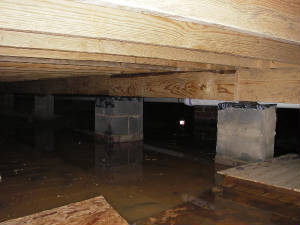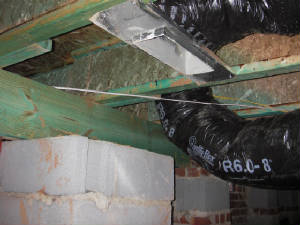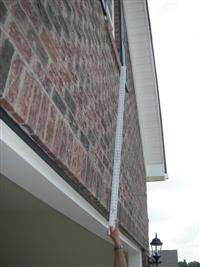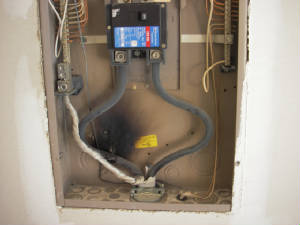|
|
 |
- Are you building a new home?
- Are you currently living out of the area and
wish you could check up on the progress of construction?
- Are you just to busy to keep running out to your
new home site to check up on the builder?
- Do you wish you really knew proper home construction
methods so you'd know if the builder was building a safe and secure home?
- Wouldn't you feel better having a licensed home
inspector and licensed general contractor checking up on the builder for you and making you aware if the builder tries to
cut corners?
These are some of the reasons for selecting Inspector Paul
to monitor the construction of your new home. We will visit the construction site as often as you like (typical new
construction inspections are: foundation inspection, framing inspection, pre-drywall inspection, and final walk through inspection). After each inspection I will provide you with a detailed inspection report.
Each inspection will include complimentary color photos of your new home as well as photos and detailed explanations of any
thing you may want to discuss with the builder.
I am not a local code enforcement official so I can not force
the builder to repair my findings, however many quality builders realize that we all make mistakes and are usually
quite accomidating.
Yes, the local
governments have a staff of well trained professional inspectors to evaluate new homes being built, the Charlotte Observer reported that the average local code enforcement official makes
over 50 inspections every day. In an 8 hour day that amounts to one inspection every 10.4 minutes,
hardly enough time to thoroughly inspect your most expensive investment.
Hiring a private inspector to have another well trained professional look over your largest investment is
a wise decision.
Clicking this link will direct you to a 6 part article that ran in The Charlotte Observer titled "Home Buyer Beware".
Read a Consumer Reports Article on New Home Construction
|
 |
|
|
 |
|
| These buyer's almost got a free swimming pool |

|
| A HVAC contractor decided to heat this crawlspace |

|
| This brick wall was bowed several inches |

|
| burnt electrical panel in a new home |

|
|
 |
|
|
|
|
|
HOME BUYER BEWARE
Builder won't fix? It's
your problem
Codes, state laws offer consumers little recourse if construction
flaws aren't repaired voluntarily by contractor
Ames Alexander
The Charlotte Observer
Dec. 9, 1998
Buy a new house in North
Carolina and you may discover the rules are stacked against you.
If builders foul up and refuse to fix problems, you can't
expect much help from the state.
If public inspectors miss major defects in your house, you can't sue them.
If your
house is more than six years old, you can't sue the builder either.
Even if you go to court and win, you probably won't
recover the thousands you paid your lawyer. You might not collect enough to repair all the problems. In fact, you might not
get a thing.
"It's truly a buyer-beware type environment," said John Marshall, a Kinston lawyer who has represented a number of homeowners in lawsuits against their builders. "You'd
better know who's going to do your building, and you'd better have checked them out, or you may well have a problem."
In
many ways, South Carolina is stricter on home builders. It revokes and suspends far more licenses. It
requires builders to have construction experience. It gives homeowners more time to sue. And it will soon require builders
to carry bonds. South Carolina's regulatory system has had one notable gap:
Some of the smaller counties don't inspect new houses. But they'll all be required to start doing so by 2000.
Dewey and
Shelia McKinney say they learned about North
Carolina's regulatory shortcomings the
hard way.
They complained to the state licensing board that the contractor building their house in Gaston
County abandoned the job, leaving subcontractors
unpaid and the McKinneys with an unfinished home full of code violations. The builder hadn't even put mortar between many
of the bricks in the chimney – a situation inspectors deemed a fire hazard.
They sued the builder, but he filed for
bankruptcy before the case came to trial. Their lawyer could find no insurance or bonding on the builder to cover the family's
losses. State law doesn't require builders to carry such insurance.
The Gastonia builder, James Holder, surrendered his license after an investigator for the state
licensing board found code violations in the home. Holder declined to comment for this article. In his response to the state,
he said he was fired by the McKinneys and would have corrected construction flaws if he'd been allowed to continue on the
job.
In the end, the McKinneys wound up moving into their house 18 months after they expected and spending about $240,000
– $70,000 more than they had planned.
"The average person – they sign a contract and they think they've got
protection," Dewey McKinney says. "But they're in for a rude awakening. There is nothing to protect you." |
|
No experience required
Ranked among the nation's top 10 states for residential construction per capita, North Carolina suffers from many of the afflictions common to fast-growing states.
Labor is in short supply, and many building inspectors are overwhelmed.
Compared to some boom states, North Carolina's system of regulating home builders is somewhat lax. Unlike six of the top 10, for instance, North Carolina doesn't require contractors to have experience. Still, North Carolina is more strict about regulating home builders than a number of slower-growing states, many of
which don't license home builders at all.
Builders argue that North Carolina's regulatory system serves home buyers well.
Mike Carpenter, chief lobbyist for the N.C. Home
Builders Association, said sensible regulations help keep a lid on house prices.
"Is all regulation bad? No," he said.
"But I think there's a strong argument to be made that over-regulation hurts affordability.
" … We've got some flaws
and warts. But I think what you'll find is we have a pretty darn good system."
Consumer advocates, on the other hand, say
it's a system that requires home buyers to be on guard.
Builders and inspectors acknowledge that in most states code requirements
are minimal. They're designed primarily to protect public health and safety, not to ensure that houses are well built.
On
most types of houses, for instance, the N.C. code doesn't require builders to install a water barrier between the exterior
siding and the internal wood frame – a relatively inexpensive measure that experts believe can help prevent costly water
damage later.
While teaching a course on the state building code last year, Davie County Inspections Director William Whaley
joked about the laxity of some code requirements.
"For parts of the book, we probably ought to ask the contractors to leave
so they don't know what they could get away with," he said.
In many counties, swamped inspectors don't have time to enforce
every facet of the building code. |
|
And North Carolina rarely checks up on them.
State law requires
an agency known as the Building Code Council to do a "thorough and continuing study" of how the state's building laws are
enforced statewide.
But the state's review is far from thorough. The state insurance department merely looks to make sure
each jurisdiction has an inspection department with licensed people. Nobody routinely checks how inspection departments do
their jobs.
That's largely because the state unit in charge of code enforcement is short-handed, according to Grover Sawyer,
who heads the division. The office has just one investigator to check complaints against the state's 3,400 active public inspectors.
Sawyer said the legislature repeatedly has rejected his requests for more staff.
"I can't guarantee every place is being
done correctly," Sawyer said.
The legal system doesn't offer protection against sloppy inspections either. In the Carolinas, as in most other states, public building inspectors generally can't be held liable
for failing to catch problems.
Owner inherits the problems
In some cases, inspectors may even require you to fix code
violations they failed to detect.
Beverly and Roger Simons figured it was bad enough that Mecklenburg County's inspectors missed so many problems on their
new Davidson house before giving it a final OK in 1995.
Within months of moving in, Beverly Simons saw rainwater, mud and
grass poured through the walls of the finished basement. Soon, the concrete floor on their porch began sinking, she says.
The Simonses hired an engineer, who found many other problems, including an inadequately supported floor, concrete footings
that weren't placed deep enough and a living room wall that appeared to be too weak to resist stiff winds.
Now, the Simonses
say, the county Building Standards Department is holding them responsible for fixing problems that its own inspectors should
have caught the first time around.
The Simonses got a visit from one of the department's inspectors last February, after
they complained to county officials about problems with their home. The inspector cited more than 30 code violations.
Among
other things, the public inspector found, the basement fireplace wasn't built correctly. The front porch and rear deck weren't
properly attached to the house. The steps to the deck weren't adequately supported. And there was too much dirt pushing against
an unreinforced portion of the foundation wall.
"The above listed conditions should be corrected as soon as possible,"
county building code administrator Gene Morton wrote in a letter to the Simonses.
Faced with a builder who they say wouldn't
fix most construction flaws, the couple have spent thousands to repair problems. And they say they plan to fix them all. But
they question why county inspectors didn't find the defects years ago.
"They said you can't sell your house with these
violations," Roger Simons said. "I'm saying, `Excuse me. You allowed somebody to sell it to me.' "
Morton noted that state
law holds the owners of houses responsible for fixing all code violations. Morton said it's possible county inspectors missed
problems, but contended the builder may also be responsible.
"I do know for a fact that this builder was changing things
after inspections were made," Morton said. "So I can't rule that out."
The builder, Gary Manus, contends the house was
well-built and noted that he gave the Simonses money to waterproof their basement walls. Sissy Manus, his wife and business
partner, said the company has never refused to fix significant problems. |
|
Licensing board has few tools
Getting help from the state isn't easy, say many who have been stuck with flawed new
houses.
The N.C. board that licenses general contractors is dominated by people in the construction industry, and has just
four investigators to check out complaints against 25,000 licensees. Compare that with South Carolina, which has eight investigators to check out
complaints against 21,000 residential contractors and subcontractors.
The N.C. licensing board can't make contractors fix
problems or offer restitution to homeowners. It can only discipline contractors. And that doesn't happen often.
During
the past seven years, the board has revoked or suspended an average of just 17 licenses a year – roughly one for every
1,300 companies licensed. In Arizona, a relatively tough regulator, the licensing
board has revoked or suspended more than 1,500 licenses during each of the past two fiscal years – or one for every
27 companies licensed.
South Carolina, meanwhile, licenses fewer builders than North Carolina but has revoked and suspended about 3 1/2 times more licenses
during the past three years.
Mark Selph, the N.C. licensing board's executive secretary, says the board is adequately staffed
and is vigilant about acting on complaints. A system like Arizona's would be expensive to implement here and would require new legislation, he said.
"I feel like
we're doing our job," he said.
Another N.C. agency that fields complaints from home buyers – the attorney general's
consumer protection office – often doesn't have the resources or legal authority to help.
When Jerry McCaughtry looks
off the deck of his new home during the rainy months, the picture isn't pretty: A stream of raw sewage sometimes flows across
the back yard. He says Union County's environmental health department has warned
that he and his kids are at risk of contracting hepatitis.
McCaughtry filed a complaint with the attorney general's office,
claiming that a failed septic system caused the trouble.
The builder unsuccessfully tried to fix the problem. But he refused
to spend any more money on it after the one-year warranty period ended, saying he had lived up to his contract and wasn't
to blame. The problem, he contended, was with the lot, not his work.
McCaughtry gave the state several addresses for the
builder. Having worked as a deputy sheriff in Mecklenburg County, McCaughtry said he had recently served the builder with civil
summonses and knew where he lived. But the attorney general's office sent McCaughtry a letter stating that it was unable to
contact the builder.
McCaughtry wishes the state had tried harder.
"They don't have the resources, so all they're doing
is putting a stamp on a letter," he said. "This is one of the most booming states in the country. And the consumers should
be protected. But we're really not."
Officials with the attorney general's office acknowledge that when it comes to investigating
allegations of shoddy construction, there's only so much they can do.
"We don't have the investigative resources to track
each and every one of them down," said David Kirkman, an assistant attorney general for the consumer protection division.
The
office's only legal tool in such cases is the state's unfair and deceptive trade practices statute – a law that requires
attorneys to prove that a builder intentionally defrauded numerous home buyers. That's a difficult standard to meet, Kirkman
said. |
|
So in most cases, the attorney general's office merely asks home builders to answer homeowners'
complaints or to try to settle their disputes through mediation. The office can't force builders to do either.
In a memo
filed with one homeowner's complaint, Kirkman noted that the staff's hands are often tied. " … There's very little we
can accomplish in these home construction cases," he wrote.
Local authorities, meanwhile, rarely take on home builders
accused of fraud or shoddy work. One reason: It's hard to prove it's an intentional criminal act rather than a breach of contract,
which is a matter for the civil courts. Such cases also aren't a priority among prosecutors swamped with more pressing crimes.
For
many who get stuck with flawed houses, the only recourse is to sue.
But they need to act quickly.
N.C. law stipulates
that homeowners who wish to sue their builders must do so within six years after the house is completed, or three years after
homeowners discover the problem – whichever comes first. Up until the mid-1980s, homeowners had 10 years to file a suit.
Trouble
is, some problems – such as the rot of wood framing that goes on behind the exterior walls of many synthetic stucco
homes – may not become apparent for five or six years.
Lawyer Fred DeVore of Charlotte, who has handled a number of stucco cases, says many homeowners miss the deadline.
In South Carolina, homeowners have up to 13 years to sue.
Everette Doffermyre,
an Atlanta attorney who has represented homeowners from various states in class-action
suits, says North Carolina's time limits "tend to be more restrictive than almost any state I've seen." |
|
Those who file lawsuits against home builders sometimes shell out tens of thousands in legal fees.
But in the Carolinas, as in many states, the laws stipulate that
they generally can't recover attorney's fees unless fraud or unfair trade practices were involved.
Even if you make the
deadline and win a judgment, you may not be able to collect if the builder has no assets or files for bankruptcy. North Carolina doesn't require builders to carry liability insurance or bonds
to protect homeowners in such instances.
"You could spend $25,000 and still not have anything but a judgment to frame on
your wall because it's uncollectable," DeVore said.
Angry about that situation, a group of N.C. residents successfully
lobbied several years ago for a recovery fund designed to compensate homeowners for losses suffered because of negligent builders.
A
$4 surcharge on permit fees for single-family homes generates money for the fund. But the state's restrictions make it hard
for homeowners to collect.
To be compensated, they must prove the contractor was dishonest or incompetent. They also need
to file a lawsuit and win a judgment that they couldn't collect on – or show that they were unable to get reimbursed
during a builder's bankruptcy proceedings.
Since 1994, the fund has assisted only 41 homeowners statewide and has paid
out less than $540,000.
Compare that to Arizona's recovery fund. Since mid-1994, the state
has helped nearly 2,000 homeowners, paying out more than $10 million.
Tip of the day:
Ask if your builder has insurance or bonding to cover you in case he makes mistakes and can't fix the problems. Find
out how long the builder has been in business. Ask for references. |
Call: Paul King 704-467-7328 (INSPECT)
1820 Sunnyside
Ave. Charlotte, NC 28204 & 201 Tom Hall St. #236 Fort Mill, SC 29715 704-307-2537-Fax
Professional, detailed, thorough home
inspections in Charlotte, Pineville, Matthews, Mint Hill, Weddington, Huntersville, Lake Norman, Waxhaw, Monroe,
and Marvin, North Carolina as well as Rock Hill, Fort Mill, Tega Cay, Lake Wylie, Indian Land, York, Clover, and
Lancaster, South Carolina.
Copyright © 2003-2008
King Construction, Inc. dba Inspector Paul
 . |
|
|
 |

